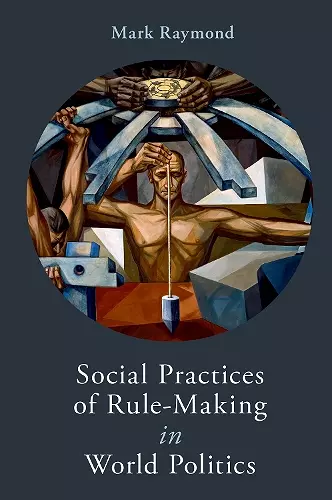Social Practices of Rule-Making in World Politics
Format:Paperback
Publisher:Oxford University Press Inc
Published:21st Dec '22
Currently unavailable, and unfortunately no date known when it will be back

Rule-based global order remains a central object of study in International Relations. Constructivists have identified a number of mechanisms by which actors accomplish both the continuous reproduction and transformation of the rules, institutions, and regimes that constitute their worlds. However, it is less clear how these mechanisms relate to each other--that is, the "rules for changing the rules". This book seeks to explain how political actors know which procedural rules to engage in a particular context, and how they know when to utilize one mechanism over another. It argues that actors in world politics are simultaneously engaged in an ongoing social practice of rule-making, interpretation, and application. By identifying and explaining the social practice of rule-making in the international system, this book clarifies why global norms change at particular moments and why particular attempts to change norms might succeed or fail at any given time. Mark Raymond looks at four cases: the social construction of great power management in the aftermath of the Napoleonic Wars; the creation of a rule against the use of force, except in cases of self-defense and collective security; contestation of the international system by al Qaeda in the period immediately following the 9/11 attacks; and United Nations efforts to establish norms for state conduct in the cyber domain. The book also shows that practices of global governance are centrally concerned with making, interpreting, and applying rules, and argues for placing global governance at the heart of the study of the international system and its dynamics. Finally, it demonstrates the utility of the book's approach for the study of global governance, the international system, and for emerging efforts to identify forms and sites of authority and hierarchy in world politics.
[A] fantastic achievement. Scholars of international security, global governance, and practice will find the book to be of value. Moreover, policymakers must consider its message: the stakes of modern great-power competition are the rules of the international system, and in this world, skill in rulemaking is as important to a state's national security interests as a bullet on the battlefield. This insight should caution U.S. policymakers who seek a retreat from global governance, as well as encourage the Biden administration as it seeks to restore U.S. leadership in the world. * Miles M. Evers, H-Diplo *
The book extends practice theory's application beyond specific aspects of world politics (like diplomacy) to the more general phenomenon of argumentation...This approach enables Raymond to make constitutive and causal explanations about the process of rule change. * Perspectives on Politics *
What goes into the making of successful global rules? In this sweeping and intellectually powerful analysis, Raymond shows that there are generic procedural rules for making rules that apply across contexts. Spanning topics from great power management and collective security to terrorism and cybersecurity, Raymond deftly reveals commonalties in the construction of governance arrangements of all types. A must-read for all students of global governance and international politics. * Martha Finnemore, University Professor of Political Science and International Affairs, George Washington University *
It's one thing to talk about rules and their properties in the abstract. It's quite another thing to talk about rules in practice-lawyers do this for a living, but only with a limited stock of formal rules; many constructivists talk about informal rules in the wooliest terms. It is altogether something else to map 'the endogenous dynamics of complex rule sets.' These are Mark Raymond's words for his ambitiously conceived, carefully executed project. Finding rules for making rules in four astutely chosen case studies, Raymond shows how two centuries of social construction have given us today's system of international governance. * Nicholas Greenwood Onuf, Professor Emeritus of Politics and International Relations, Florida International University *
If global governance is about rule-making and interpretation, these activities are themselves governed by secondary rules. In one of the most thoughtful constructivist works of recent years, Mark Raymond examines how and why social practices of secondary rule-making have structured global security orders from the Concert of Europe to the campaign against al Qaeda and ongoing efforts to regulate cyberwarfare. * Jason Sharman, Sir Patrick Sheehy Professor of International Relations, University of Cambridge *
ISBN: 9780197674864
Dimensions: 154mm x 236mm x 18mm
Weight: 422g
280 pages